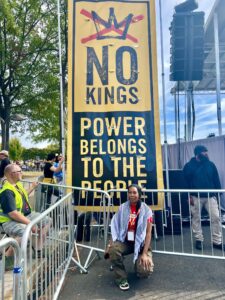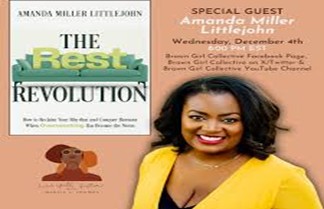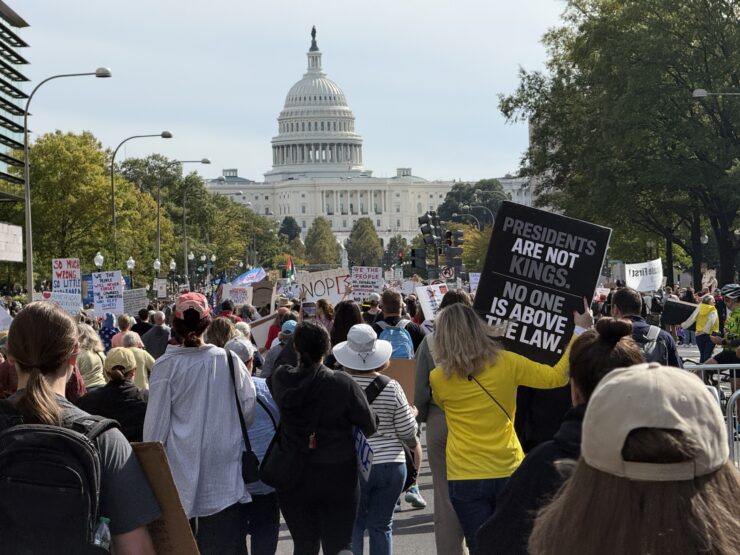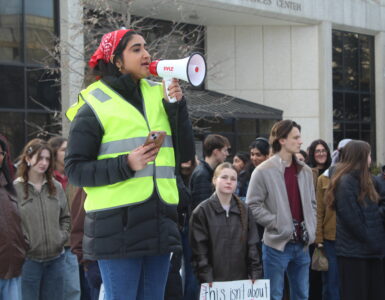As millions gathered in mid-October for the nationwide “No Kings” rally, protesting what organizers describe as authoritarian policies under President Donald Trump, some Black women opted out. It wasn’t apathy, but a strategy of rest and restoration, they said.
The women said they have a reason for skipping the demonstrations against the administration: it’s time for others to step up.
During the 2024 presidential election, 92% of Black women voted for Democratic candidate Kamala Harris. After her defeat, some chose to disengage from today’s demonstrations to prioritize their own well-being.
However, others said that while rest is important, citizens should not abandon participation in resistance movements.
At a time when Black women face further marginalization, some sat out a rally that had more than 7 million participants nationwide, but no clear action steps, some said.
“Black women are tired of empty performative action,” said Sherri Williams, associate professor in Race, Media and Communication at American University.
Williams explained that the issue is not about disengagement but about choosing when and how to engage. Black women chose to unshoulder political burdens and prioritize self.
“’Rest as protest’ means Black women are really thinking strategically about where they will invest their energy,” Williams said.
Exhausted, but ‘still showing up’
Still, the rally was compelling for some protesters.
Activist Imani Bashir spent the day under a tent helping people understand their power as jurors and taxpayers and sharing information about labor unions.
She described the rally as a “white liberal space,” a space with predominantly white attendees and no plan of action. She felt it lacked a sense of urgency, disruption, and clear demands, and felt more like a parade than a protest.
Bashir said she understood why others skipped the event. However, she said doing nothing is not enough.
“Some are throwing up their hands,” Bashir said. “But most of the Black femmes, trans folks, and gender-nonconforming people I know are exhausted — and still showing up.”

Opting out
Kia Braxton, an emergency management contractor who works on social justice issues, stayed home. She found little reason to express herself publicly again.
“My protest was back in November when I voted for the only competent, capable choice who was on the ballot who happened to be a Black woman,” Braxton said.
Braxton said protests should not be “comfortable pursuits.” She said the rally was more of a “social gathering.”
Braxton told The Wash that Black people are still resisting, even if they don’t appear in demonstrations. Black people, she said, historically have been working for everyone’s benefit.
“We’ve earned our rest,” Braxton said. “We are still doing the work, just not the way you expect.”
“The Rest Revolution”
Amanda Littlejohn, author of The Rest Revolution, recognizes how going back to the basics of rest and well-being is helping Black women deal with burnout from advocacy.
Littlejohn and others are turning inward to prioritize their physical and mental health above advocacy.
As her critics call rest a luxury, she pushes back.
“Rest is not a luxury or something that we have to earn,” Littlejohn said. “You can’t outwork racism; you can’t outwork sexism. Your excellence cannot fix systemic issues.”
Littlejohn criticizes the oft-repeated doctrine that Black women must be “twice as good” to succeed. She said it normalizes exhaustion to an unhealthy degree.
“Rest is being in community with people who are supportive to you,” Littlejohn said. “Rest is making room for joy and things that replenish, refuel, and energize you.”

Intergenerational burnout
Clinical psychologist and founder of Vivid Innovations Consulting Ashley Elliott, popularly known as Dr. Vivid, said that rest is a form of resistance.
Elliot said that resting allows others to step up and act. She added that since Black women have carried the load, others need to contribute.
“That resistance is a show of growth in our mindset,” Elliot said. “We understand we are doing more harm than good if we continue to show up on the battlefield for people who won’t show up for us unless we start the work.”
The Arlington-based psychologist told The Wash that Black women have taken on the role of keeping communities together, sometimes neglecting their own needs, resulting in generational cycles of burnout.
To break generational cycles of burnout, Elliot said Black women must remember they also deserve the love, rest, and safety they provide others.
Elliot said that Black women can often feel guilty for resting due to societal pressures. When this guilt rises, there is a way to counteract that – with evidence.
“What have you done for yourself, for your family, for your community that has proved fruitful, effective, positive, beneficial?” Elliot asks. “Acknowledging that that work, no work, no matter how long or short in the task or the project, is enough to justify rest.”
Not exactly “rest”
Anna Malaika Tubbs, sociologist and author of Erased: What American Patriarchy Has Hidden from Us, said that because Black women were pushed furthest from the original U.S. patriarchal structure, they had to imagine and fight for better conditions.
“The Founding Fathers … were building a republic of men, white men in particular, who they saw as elites,” Tubbs said. “They painted Black women as the complete opposite of American patriarchy and the benefits that are afforded to them.”
The sociologist said that when Black women do not always appear at rallies or events, it is not because they are necessarily resting in the traditional sense of the word.
“Our day-to-day life is resistance,” Tubbs said. “The way we parent our children to still live and love and thrive in a nation that often tries to attack them, is our resistance.”
Black women aren’t giving up, Tubbs said, it’s just time for others to “wake up.”















Well done! I appreciate the focus on the nuance: it’s not about apathy, but about strategic choices, mental-health preservation, and long-standing structural burdens that we are no longer willing to shoulder on our own.
Excellent article! Would be good to learn what action agenda -if any- came out of the No Kings March. Also, does anyone cover the neighborhood beat up in Takoma/Shepherd’s Park/Brightwood/Petworth?